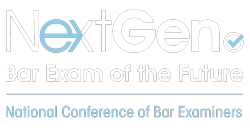In January 2021, NCBE completed a three-year study to ensure that the bar exam continues to test the knowledge, skills, and abilities required for competent entry-level legal practice. Input from stakeholders was gathered at each step, with qualitative and quantitative research conducted by external expert consultants, including a nationwide practice analysis survey. Reports from each phase of the work are available at https://nextgenbarexam.ncbex.org/reports/. The study resulted in a set of recommendations for the redesign of the bar exam.
Also in 2021, NCBE appointed a Content Scope Committee to make recommendations regarding the breadth and depth of the Foundational Concepts and Principles (subjects) and the Foundational Skills to be tested on the new exam. A list of the members of the Content Scope Committee can be found at https://nextgenbarexam.ncbex.org/announcing-ncbes-content-scope-committee/.
In considering the breadth of topics to be covered within each subject, the Content Scope Committee primarily considered the following three factors:
Frequency: How often is a newly licensed lawyer (defined as one who has practiced for fewer than three years) likely to encounter the topic in general entry-level practice (loosely defined as solo practice or working at a full-service law firm)?
Universality: How likely is a newly licensed lawyer to encounter the topic in more specialized types of entry-level practice?
Risk: How likely is it that there will be serious consequences if a newly licensed lawyer does NOT have any knowledge of the topic when it arises?
In considering at what depth the topics should be tested, the Content Scope Committee focused on how much detail a newly licensed lawyer should recall about each topic, without research, to provide minimally competent legal services, primarily considering the following three factors:
Complexity: How complex or nuanced is the legal doctrine in this topic?
Context: How quickly must a lawyer act when this topic arises (i.e., would a newly licensed lawyer typically have time to conduct research before providing counsel)?
Stability/Universality: Is the doctrine relatively stable or in flux? Is there a clear majority approach among the states (or circuits)? (These questions sometimes overlapped in the Content Scope Committee’s discussions.)
During pilot and field testing, which will be conducted in 2022 and 2023, NCBE will be evaluating the optimal way to provide legal resources (e.g., Federal Rules of Evidence) during the exam in a way that is fair to all and enable candidates to use the resources efficiently in the time allotted.
In addition to the factors listed above, for the subject of Constitutional Law the Content Scope Committee also considered lawyers’ roles as custodians of the Constitution when evaluating the scope of topics to be tested.
Finally, in considering the specific lawyering tasks that examinees should be able to perform on the new exam to demonstrate the Foundational Skills, the Content Scope Committee considered the following three factors:
Practice Analysis Continuity: What examinee tasks will align best to the lawyering tasks identified in the practice analysis as being important to newly licensed lawyers?
Universality/Balance: What examinee tasks are related to the greatest number of lawyering tasks from the practice analysis? What examinee tasks will best balance different kinds of practice (e.g., transactional work vs. litigation)? (These questions sometimes overlapped in the Content Scope Committee’s discussions.)
Cost/Practicality: Given NCBE’s commitment to affordability, what aspects of the Foundational Skills can be realistically tested in a written exam?




